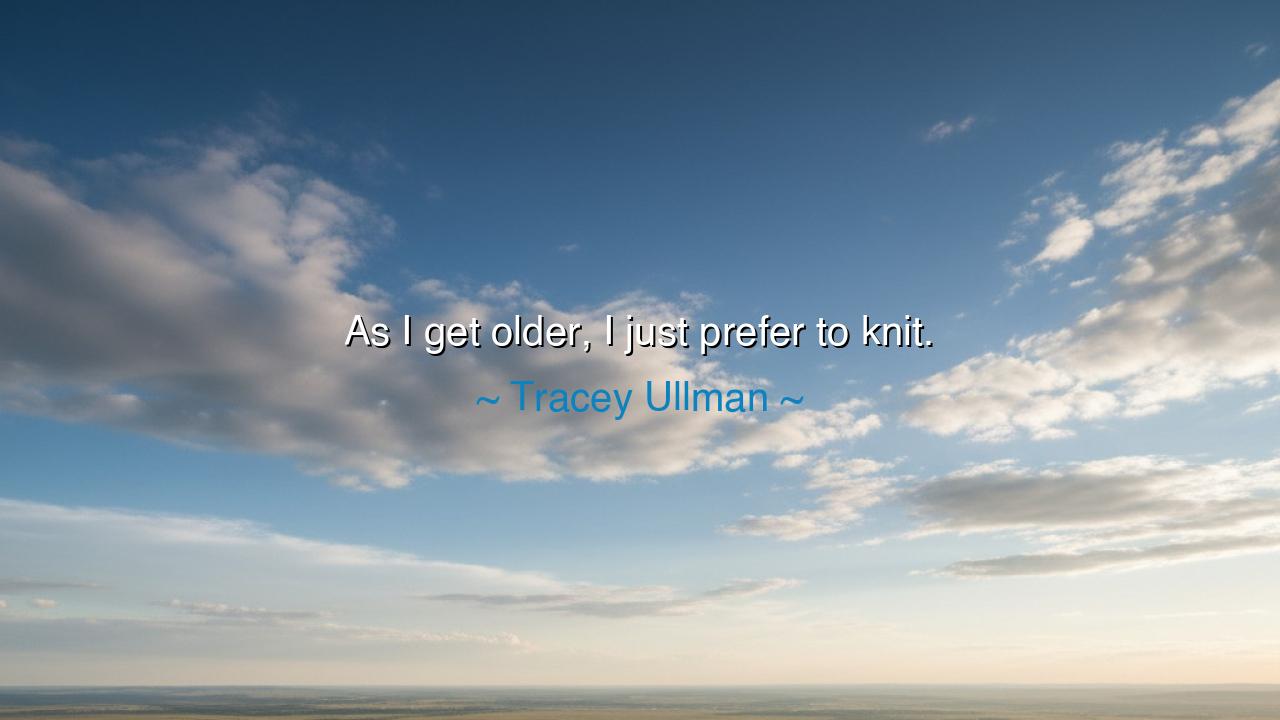
As I get older, I just prefer to knit.






“As I get older, I just prefer to knit.” — Tracey Ullman
At first hearing, these words seem light — almost humorous — the confession of a woman retreating from the noise of the world into quiet domesticity. Yet beneath their simplicity lies an ancient truth about aging, peace, and the transformation of desire. In youth, the heart runs wild; it burns for adventure, applause, and the tumult of ambition. But as the years pass, the fire softens into a steady flame. The soul, having wandered far, begins to long not for excitement, but for meaning — for creation born not of spectacle, but of stillness. Thus, when Tracey Ullman says she prefers to knit, she is not merely speaking of yarn and needles, but of a way of being — the art of finding serenity through mindful creation.
The ancients, too, revered such simplicity. They taught that the wise seek balance, not excess — harmony, not frenzy. The Greek philosopher Epicurus lived not in palaces but in a small garden, where he found joy in modest meals and good conversation. Likewise, the Roman statesman Cicero once said, “If you have a garden and a library, you have everything you need.” These sages understood what Ullman’s words express: that fulfillment does not come from conquest or chaos, but from craft and contemplation. To knit is to take what is tangled and bring it into order, to transform confusion into pattern — a metaphor for the inner work of the soul.
There is a story from history that mirrors this truth. When Queen Elizabeth I grew weary of the intrigues of her court, she turned to needlework. She, who once ruled an empire, found solace in thread and cloth. The same hands that signed treaties and decrees began to embroider flowers and vines — not as distraction, but as renewal. In those quiet hours, the queen was no longer monarch, but woman — at peace with her own company. Like her, Tracey Ullman’s preference for knitting is a turning inward, a declaration that creation for its own sake is more valuable than the fleeting noise of the crowd.
In knitting, there is rhythm — a repetition that soothes the spirit. Each stitch is an act of focus, a meditation, a moment of order drawn from chaos. The act itself becomes symbolic of life’s continuity — how time, like yarn, unravels and rewinds, binding moments into the fabric of memory. To knit is to participate quietly in eternity, to move beyond striving and rest in being. The ancients would have called it ataraxia — the state of untroubled peace that comes when one is aligned with the natural rhythm of existence.
The quote also speaks of choice and acceptance — the wisdom to recognize what truly nourishes the heart. Ullman’s words, when viewed through the lens of age, echo the lesson of the Buddha: that the endless pursuit of stimulation leads only to exhaustion. As we grow older, we begin to see that joy need not be loud to be profound. The steady act of creation — a meal prepared with love, a garden tended, a scarf slowly emerging beneath patient hands — becomes a form of prayer. In the stillness of such work, one meets the divine.
There is, too, a quiet defiance in the quote. In a world that glorifies busyness and endless ambition, to choose simplicity is a radical act. To say “I prefer to knit” is to say, “I no longer measure my worth by the world’s noise.” It is the wisdom of those who have seen the futility of striving and learned the power of contentment. The ancients would have called this the second youth — the season of life when energy turns inward, and what once was sought outside is now found within.
So, my child, take this teaching to heart: one day, you too will feel the pull toward stillness. When that time comes, do not resist it. Learn to prefer the quiet crafts of the soul — to write, to paint, to mend, to build, to tend something that grows slowly under your care. In doing so, you will discover that creation need not be grand to be sacred. Let your hands move with patience, and your heart with gratitude. For when you learn to love the simple act — to “prefer to knit,” as Ullman says — you will have found what the ancients called the peace that passes understanding.
And then you will see, as they did, that the truest joy is not in the applause of the world, but in the silent, rhythmic work of your own two hands — weaving beauty from the threads of an ordinary life.






AAdministratorAdministrator
Welcome, honored guests. Please leave a comment, we will respond soon